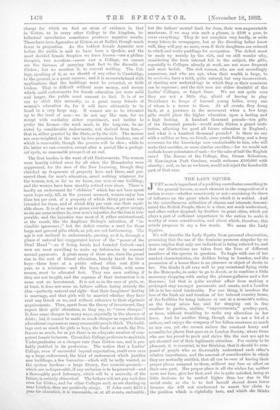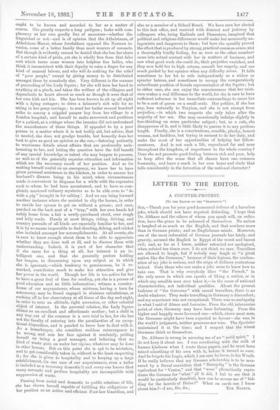THE LADY SQUIRE.
JUST as each ingredient of a pudding contributes something to the general flavour, so each element in the composition of a nation is ever—whether consciously or not—exercising its share of influence on the great whole into which it is welded. And in the miscellaneous collection of classes and interests denomi- nated the British People, there is a class, not much understood,
and often rather despised, by dwellers in great cities, which yet plays a part of sufficient importance in the nation to make it worthy of some consideration, and about which, therefore, this article proposes to say a few words. We mean the Lady Squires.
We will describe the Lady Squire from personal observation, premising that the use of the feminine pronoun singular by no means implies that only one individual is being referred to, and that our illustrations are taken from the lives of different members of the species in question. To begin with one of her marked characteristics, she dislikes living in London, and the possession of a house there is no pleasure or object of desire to her. She thinks it all very well to pay occasional flying visits to the Metropolis, in order to go to Ascot, or to combine a little necessary shopping with seeing the picture-galleries and a few theatres ; but that is quite another affair from making a prolonged stay' amongst pavements and smuts, and a London life is to her mind intolerable. For one thing, it involves the loss of the fresh air and freedom of her beloved country home, of the facilities for being indoors or out at a moment's notice, as the fancy seizes her, and for stepping out in fine weather to garden, stables, "improvements," poultry-yard, or farm, without troubling to make any alteration in her dress. And for another thing, though she is not a bit of a recluse, and enjoys the company of her fellow-creatures as much as any one, yet she cannot endure the constant hurry and scramble for places that goes on in London Society, where those who are too proud to push and strive like the rest are apt to get shunted out of their legitimate situation. For society to be pleasant, it is essential, to her thinking, that it should be com- posed of people who so thoroughly understand each other's relative importance, and the amount of consideration to which they are mutually entitled, that all can be sure of having their proper places assigned to them, without any fuss or effort on their own part. Her proper place is all she wishes for, neither more nor less; give her that, and she is quite satisfied, being as little desirous to be ranked higher than her due in the social scale, as she is to find herself shoved. down lower because she will not condescend to assert her claim to the position which is rightfully hers, and which she thinks ought to be known and accorded to her as a matter of course. She greatly respects a long pedigree ; looks with com- placency at her own goodly line of ancestors—whether dis- tinguished or not—and is of opinion that the Athelstanes, of Athelstane Manor, whose forefathers opposed the Norman in- vasion, come of a better family than most wearers of coronets. But though it evidently cannot be denied that she has her share of a certain kind of pride, yet she is wholly free from that false sort which tarns some women into helpless fine ladies, who think it inconsistent with their dignity to raise a finger for any kind of manual labour, and who will do nothing for the relief of "poor people," except by giving money to be distributed amongst them by somebody else. Very different is the manner of proceeding of the Lady Squire ; for she will turn her hand to anything at a pinch, and takes the welfare of the villagers and dependants to heart almost as much as though it were that of her own kith and kin. She has been known to sit up all night with a dying cottager; to drive a labourer's sick wife for an airing in her pony.carriage ; to send her butler several hundred miles to convoy a crippled pauper boy from her village to a London hospital ; and herself to make arrowroot and poultices for a patient, at a cottage where the inmates did not understand the manufacture of these things. If appealed to by a poor person in a matter where it is not bodily aid, but advice, that is needed, she does not grudge trouble, but honestly does her best to give as good an opinion as she can,—listening patiently to wearisome details about affairs that are profoundly unin- teresting to her, and letting the question have the full benefit of any special knowledge or talent she may happen to possess, as well as of the generally superior education and information which are the necessary result of her position. And as for snaking herself useful on an emergency, we know her to have given personal assistance in the kitchen, in order to ensure her husband's dinners being to his mind, when circumstances made it convenient to dispense for a while with the expensive cook to whom he had been accustomed, and to have so com- pletely mastered culinary mysteries as to be able even to "do with a pig" brought in for salting ! And we can bring forward another instance where she assisted to clip the horses, in order to enable her spouse to get on without a groom ; and once, perched on the back seat of a "trap," with her own hands led safely home from a fair a newly-purchased steed, over rough and hilly roads. Handy at most things, riding, driving, and Country pursuits of all kinds are especially familiar to her, and it is by no means impossible to find shooting, fishing, and cricket also included amongst her accomplishments. At all events, she is sure to know enough about them to be able to appreciate whether they are done well or ill, and to discuss them with understanding. Indeed, it is part of her character that if she cares for a thing at all, her interest is an in- telligent one, and that she generally prefers holding her tongue, to discoursing upon any subject as to which fihe is ignorant,—which tendency to genuineness, be it re- marked, contributes much to make her attractive and give her power in the world. Though her life is too active for her to have a great deal of time for reading, yet she is a person of good education and no little information ; witness a country- house of our acquaintance, whose mistress, having a turn for astronomy, may be found engaged in abstruse calculations, or rushing off to her observatory at all times of the day and night, in order to note an altitude, right ascension, or other celestial cbject of interest. In the parental relation, the Lady Squire shines as an excellent and affectionate mother ; but a child in any way out of the common is a sore trial to her, for she has not the faculty of entering into the peculiarities of an excep- tional disposition, and is puzzled to know how to deal with it. As a. housekeeper, she considers reckless extravagance to be Wrong, and sets her face against it resolutely, priding h.erself on being a good manager, and believing that no .kincl. of waste goes on under her rggime, whatever may be done in other houses. But on this point she is apt to be mistaken, and to get considerably taken in, without in the least suspecting it ; for She is given to hospitality and. to keeping up a large establishment, (in one case of our acquaintance, even a tailor is included as a necessary domestic!) and every one knows that many servants and profuse hospitality are incompatible with suppression of waste.
Passing from social and domestic to public relations of life, elle has shown herself capable of fulfilling the obligations of her position as an active and efficient Poor-law Guardian, and
also as a member of a School Board. We have seen her elected to this last office, and received with distrust and jealousy by colleagues who, being Radicals and Dissenters, imagined that political and religious differences would make her necessarily an- tagonistic and dangerous to them ; but here she speedily proved the effect that is produced by strong, practical common-sense, and a thoroughly kindly feeling, for as soon as the other members came into actual contact with her in matters of business, and saw what good work she could do, their prejudice vanished, and they now hold her in high esteem, consult her eagerly, and are much guided by her opinion when any difficulty arises. It falls sometimes to her lot to rule independently as a widow or spinster heiress, and sometimes to occupy the comparatively subordinate position of female representative of the Squire ; but in either case, she can enjoy the consciousness that her exist- ence makes a real difference to the world, for she is sure to have sufficient influence in her immediate surroundings to cause her to be a sort of queen on a small scale. Her politics, if she has any, lean naturally to Toryism, and she is not exempt from prejudice,—in which two respects she only takes after the majority of her sex. She may occasionally indulge slightly in free-thinking on some particular subject ; but, as a rule, she disapproves of it, and is little likely to pursue it to any perilous length. Finally, she is a conscientious, sensible, plucky, honest woman, not faultless, but trying in earnest to do her duty, and make the most of her opportunities of helping her fellow- creatures. And is not such a life, reproduced far and near throughout the kingdom, of importance to the whole country ? Does she not promote good-feeling between rich and poor, help to keep alive the sense that all classes have one common humanity, and leave a mark in her own home and circle that tells considerably in the formation of the national character ?



































 Previous page
Previous page